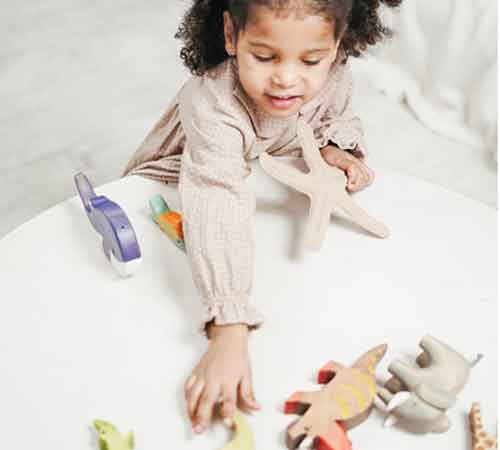
Indulging in the right ‘age groups activities’ will help a child grow when it comes to learning. Imagine that, as a parent, you wonder what to do with your baby all day.
Play is an essential part of your child’s learning and growth, allowing them to explore their environment, develop skills, and bond with their caregivers. As your baby grows, playtime will evolve based on the developmental skills they are working on.
According to a UNICEF report, here are some activities suitable for different age groups:
For 1-year-olds:
Play hide-and-seek by hiding toys or objects under a towel or blanket. Encourage your baby to find them and help them if needed. This game or age group activity teaches object permanence, showing your baby that objects still exist even when out of sight.
Use words to describe objects your baby points to. For example, if they point to a ball, say, “Do you want your ball? Here is your ball! Let’s play with the ball!” Make the descriptions fun and engaging to keep your baby interested.
This helps your baby learn new words and builds their self-esteem.
Create a water wonder bottle by filling a container with water, beads, or marbles. Give it to your baby to shake and observe, helping them practice their visual skills.
Focus on:
Sensory play: Provide opportunities for sensory experiences, such as touching, tasting, smelling, hearing, and seeing.
Motor skills: Encourage crawling, walking, and manipulating objects.
Language: Talk to your child regularly, respond to their coos and babbles, and introduce simple words and phrases.
Emotional intelligence: Label and validate your child’s emotions and teach them to express feelings.
For 2-year-olds:
Invite your toddler to help with household tasks, such as sorting clothes or serving food. Make it a game and praise their efforts, fostering independence and self-esteem.
Encourage creativity through art projects like drawings, finger paintings, or arranging materials found outside. Display their finished work, promoting their imagination and independence.
Build a tower using blocks or stackable objects, and let your toddler knock it down. This game helps develop fine motor skills and hand-eye coordination.
Vocabulary building: Encourage your child to use simple sentences and introduce new vocabulary.
As your child grows, they begin to develop their social skills. They learn the art of sharing, the value of taking turns, and the joy of interacting with others. These are all signs of their healthy development, and as a parent, it’s reassuring to see them mastering these skills.
Gross motor skills: Encourage running, jumping, and kicking a ball.
3-Year-Old
Storytelling: Encourage your child to tell simple stories and engage in imaginative play.
Pre-math skills: Introduce basic math concepts, such as counting, sorting, and patterning.
Fine motor skills: Encourage your child to use scissors, crayons, and other materials to develop their fine motor skills.
Emotional regulation: Teach your child to recognise, express, and manage emotions.
4-Year-Old
Children begin to develop their social skills at this age and learn to cooperate with others. Teach them:
Cooperation and teamwork: Encourage your child to work with others to achieve a common goal.
Self-confidence: Encourage your child to try new things and praise their efforts.
Pre-reading skills: Introduce basic reading concepts, such as recognising letters and understanding that text carries meaning.
Self-care: Encourage your child to care for their physical needs, such as dressing and using the bathroom.
5 Year Old
As your child approaches age five, they are on the cusp of a new and exciting chapter in their educational journey.
This is a time of great curiosity and exploration, and it’s essential to provide them with a solid foundation in various skills that will serve them well in the coming years.
Pre-writing skills are one of the most critical areas of focus at this age.
Your child is likely to be fascinated by the written word and eager to start writing their name, drawing simple shapes, and even attempting to spell short words.
Encourage them to practice writing their name, beginning with the first letter and gradually adding more letters.
You can also give them simple writing prompts like tracing shapes or drawing pictures.
Math concepts are another essential area of focus at this age, while considering age groups activities.
Your child is beginning to develop problem-solving skills and is naturally curious about numbers and quantities. Introduce them to basic math concepts such as addition, subtraction, and shapes.
You May Also Read: How To Answer Your Child’s Sensitive Questions About Body Parts
You can use everyday objects, such as counting blocks or toys, to demonstrate these concepts.
For example, you can ask your child to count how many blocks are in a tower and then ask them to add or subtract a specific number.
Science exploration is also vital to your child’s educational journey at this age. Encourage them to explore the natural world around them, ask questions, and seek answers.
Essential Social Skills
You can take them on nature walks, visit science museums or zoos, or simply observe the world around them. Encourage them to ask questions and think critically about the world around them.
Finally, social skills are essential for your child’s emotional and psychological well-being. At this age, they begin developing friendships and learning how to cooperate with others.
Encourage them to share toys, take turns, and resolve conflicts peacefully and respectfully.
You can also role-play social scenarios with them, such as sharing a toy or apologising to a friend.
After all, focusing on these critical areas can give your child a solid foundation for future success and help them develop into confident, curious, and compassionate individuals. Remember to adapt playtime activities to their developmental stage.



